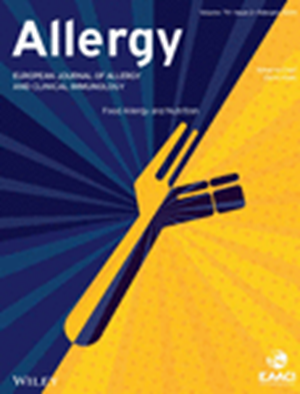妊娠、哺乳期间坚持地中海饮食和后代食物过敏的发生:MEDALLION队列研究的结果
IF 12
1区 医学
Q1 ALLERGY
引用次数: 0
摘要
背景:预防是减轻食物过敏负担的关键策略。怀孕和哺乳期间的母亲饮食越来越被认为是导致FA风险的一个因素。方法:我们分析MEDALLION研究的亚队列数据,以评估母亲坚持地中海饮食(MedDiet)与后代FA发展之间的关系。孕妇在怀孕和哺乳期间的饮食摄入量是使用一个有效的量表,即MedDiet评分,以及个别食物组的消费进行评估。采用多元逻辑回归模型。结果共纳入430对母子对。母亲对MedDiet的较高依从性与后代在妊娠期(调整后OR 0.94, 95% CI 0.89-1.00)和哺乳期(调整后OR 0.94, 95% CI 0.88-1.00)发生FA的几率降低相关。怀孕期间每周增加水果和全脂乳制品的摄入量,母乳喂养期间增加蔬菜摄入量,与后代患FA的可能性降低有关。相反,在这两个时期摄入更多的家禽和红肉(每周30份),以及在怀孕期间摄入更多的鱼类(每周100份),与FA的几率增加有关。结论:本研究指出,MedDiet,特别是一些特定的成分,如水果、蔬菜和全脂乳制品,可能有助于降低婴儿患FA的风险,而摄入更多的家禽、红肉和鱼可能会增加患FA的风险。这些发现支持了母体营养减少儿童FA的潜力。本文章由计算机程序翻译,如有差异,请以英文原文为准。
Adherence to Mediterranean Diet During Pregnancy, Breastfeeding, and Development of Food Allergy in the Offspring: Results From the MEDALLION Cohort Study.
BACKGROUND
Prevention is a key strategy for reducing the burden of food allergies (FA). The maternal diet during pregnancy and breastfeeding is increasingly recognized as a factor contributing to FA risk.
METHODS
We analyzed data from a sub-cohort of the MEDALLION study to evaluate the association between maternal adherence to the Mediterranean Diet (MedDiet) and the development of FA in offsprings. Maternal dietary intake during pregnancy and lactation was assessed using a validated scale, i.e., the MedDiet Score, along with individual food group consumption. Multiple logistic regression models were performed.
RESULTS
A total of 430 mother-offspring dyads were included in the analysis. Higher maternal adherence to the MedDiet was associated with reduced odds of FA in offspring during both pregnancy (adjusted OR 0.94, 95% CI 0.89-1.00) and lactation (adjusted OR 0.94, 95% CI 0.88-1.00). Increased weekly consumption of fruits and full-fat dairy products during pregnancy, and vegetables during breastfeeding, was associated with reduced likelihood of FA in the offspring. Conversely, higher intake of poultry and red meat (> 3 servings/week) during both periods, and fish consumption during pregnancy (> 1 serving/week), were associated with increased odds of FA.
CONCLUSIONS
This study points out that the MedDiet and, especially, some specific components, such as fruits, vegetables, and full-fat dairy products, may contribute to lowering the risk of FA in infants, whereas a higher intake of poultry, red meat, and fish may increase it. These findings support the potential of maternal nutrition to reduce childhood FA.
求助全文
通过发布文献求助,成功后即可免费获取论文全文。
去求助
来源期刊

Allergy
医学-过敏
CiteScore
26.10
自引率
9.70%
发文量
393
审稿时长
2 months
期刊介绍:
Allergy is an international and multidisciplinary journal that aims to advance, impact, and communicate all aspects of the discipline of Allergy/Immunology. It publishes original articles, reviews, position papers, guidelines, editorials, news and commentaries, letters to the editors, and correspondences. The journal accepts articles based on their scientific merit and quality.
Allergy seeks to maintain contact between basic and clinical Allergy/Immunology and encourages contributions from contributors and readers from all countries. In addition to its publication, Allergy also provides abstracting and indexing information. Some of the databases that include Allergy abstracts are Abstracts on Hygiene & Communicable Disease, Academic Search Alumni Edition, AgBiotech News & Information, AGRICOLA Database, Biological Abstracts, PubMed Dietary Supplement Subset, and Global Health, among others.
 求助内容:
求助内容: 应助结果提醒方式:
应助结果提醒方式:


